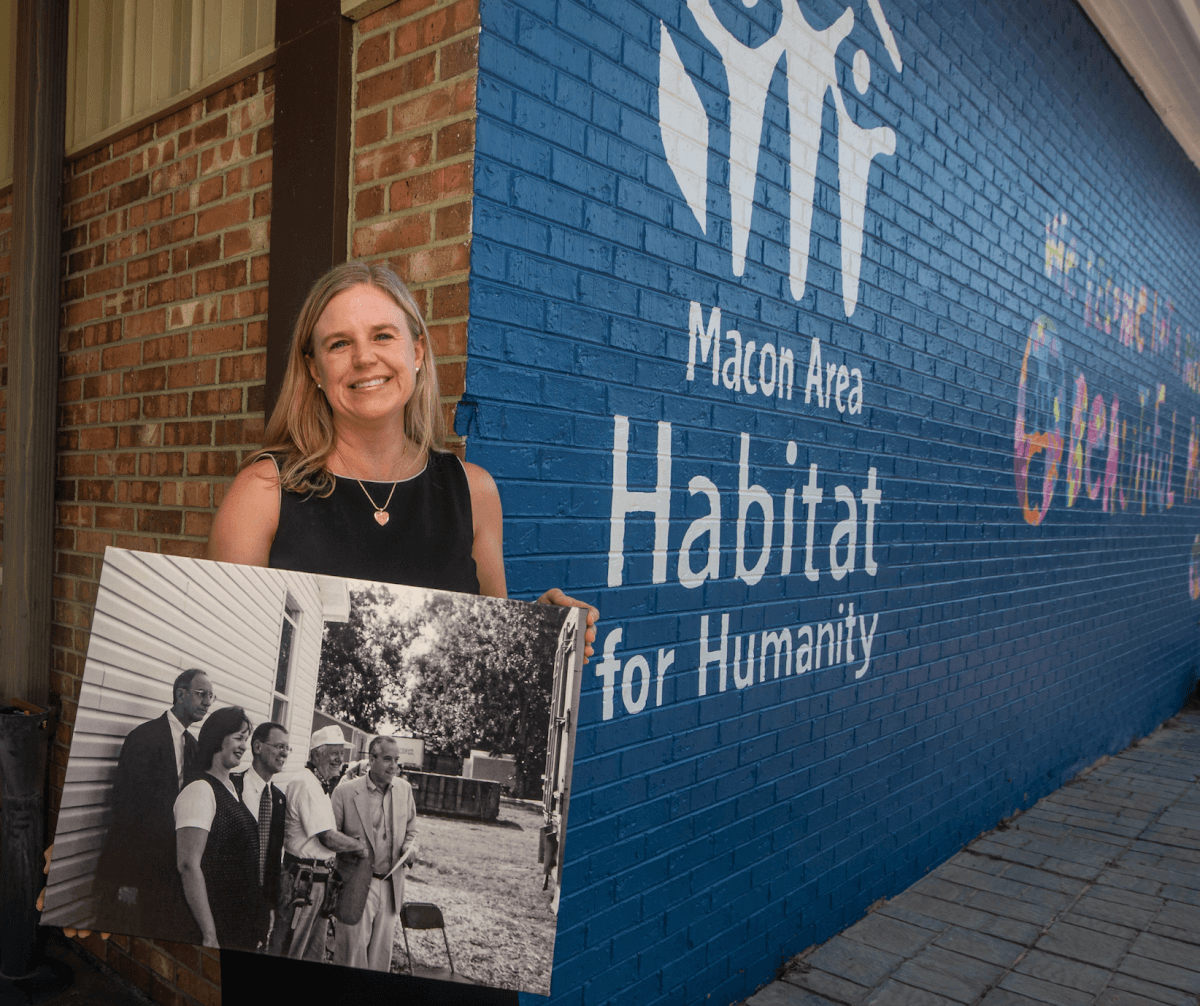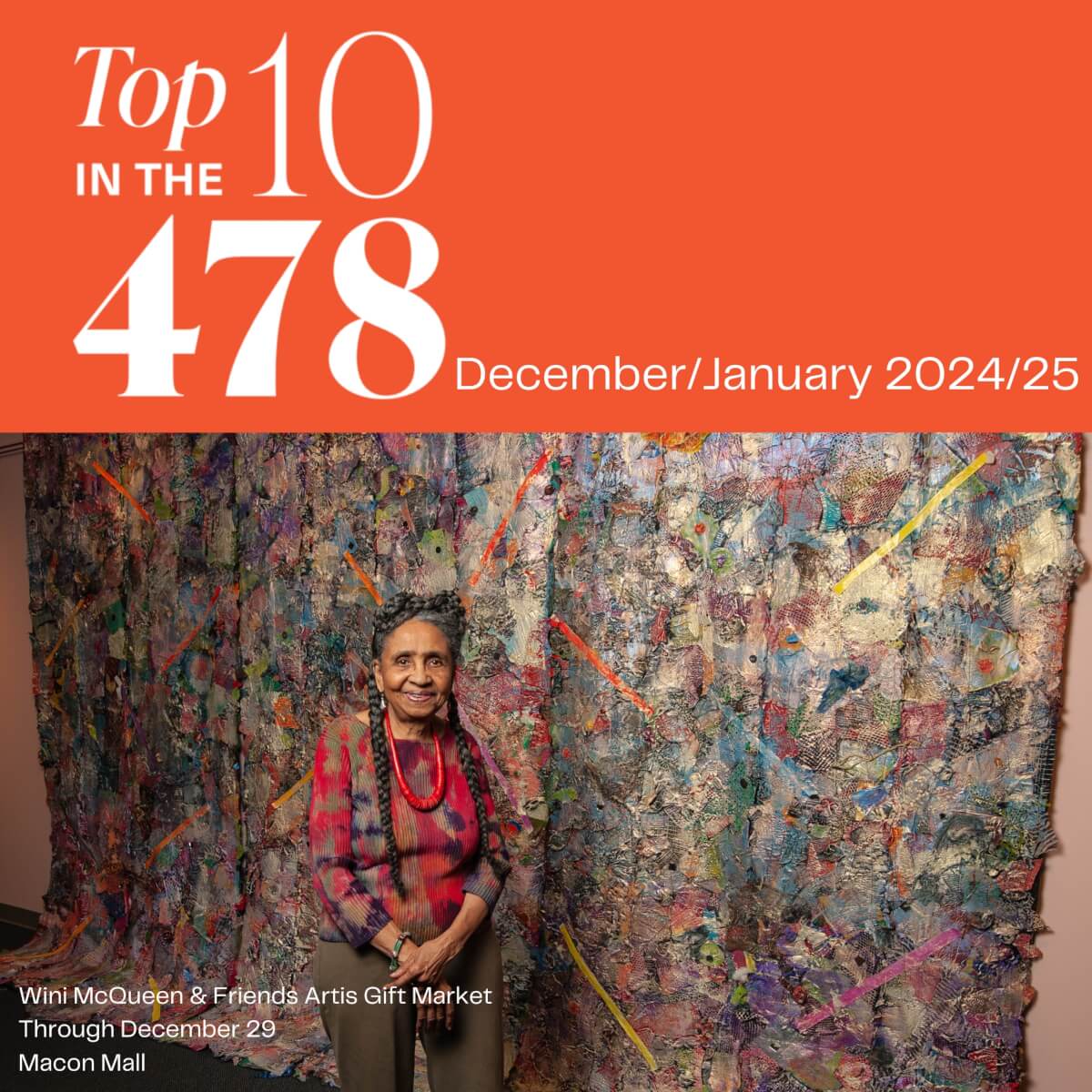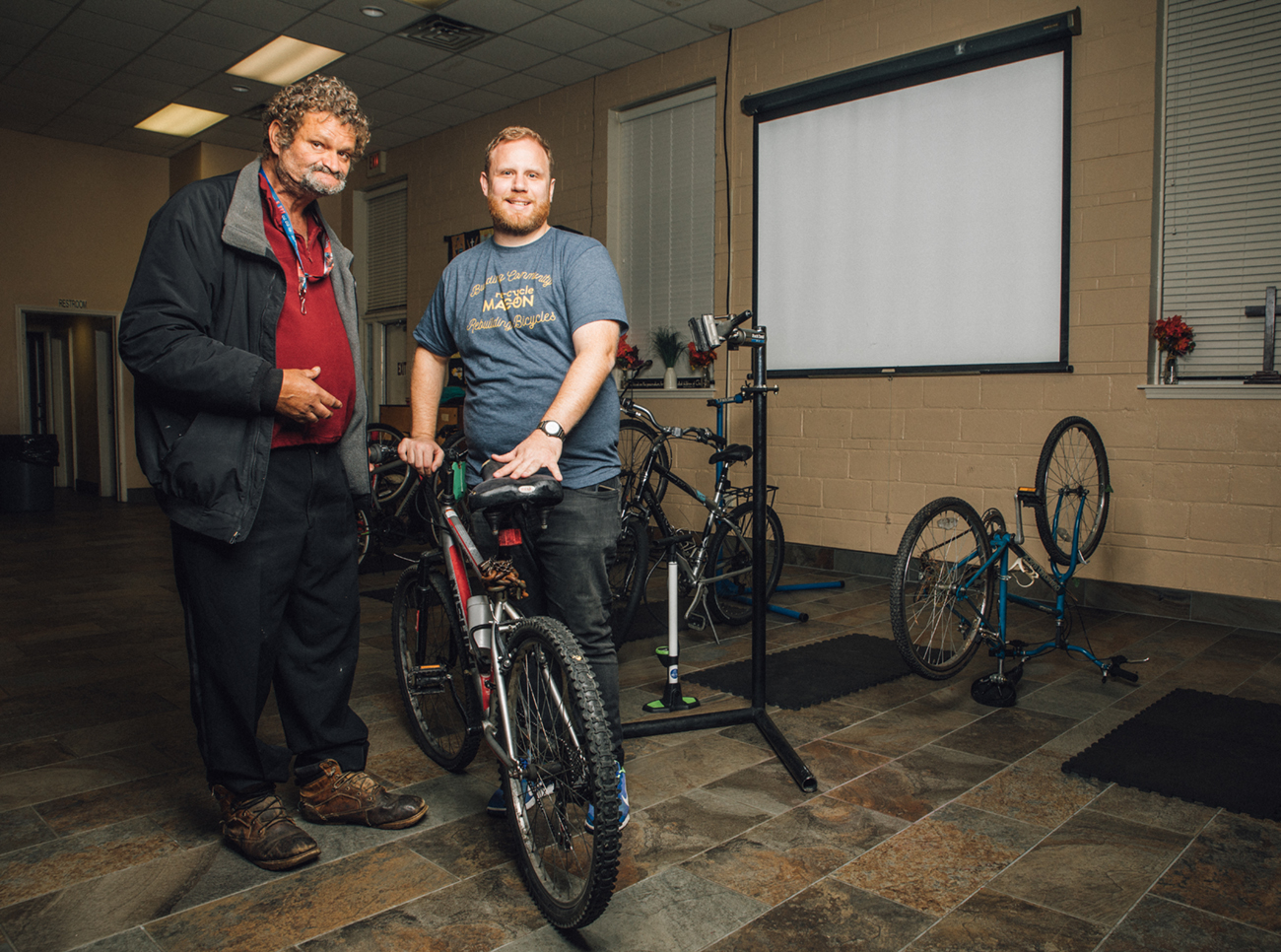
‘I got a bike and got a life back’
Re-Cycle Macon’s earn-a-bike program creates transportation and builds community
By Michael W. Pannell
Photography by Matt Odom
Looking at the number of bicycles Re-Cycle Macon has provided to people in need of basic transportation since 2017, you would think they are all about building and repairing donated bicycles and passing them along.
But they’re not.
Re-Cycle Macon does that – and does it well. But the group’s true aim is helping to build community and thereby helping to repair people.
It does that well, too.
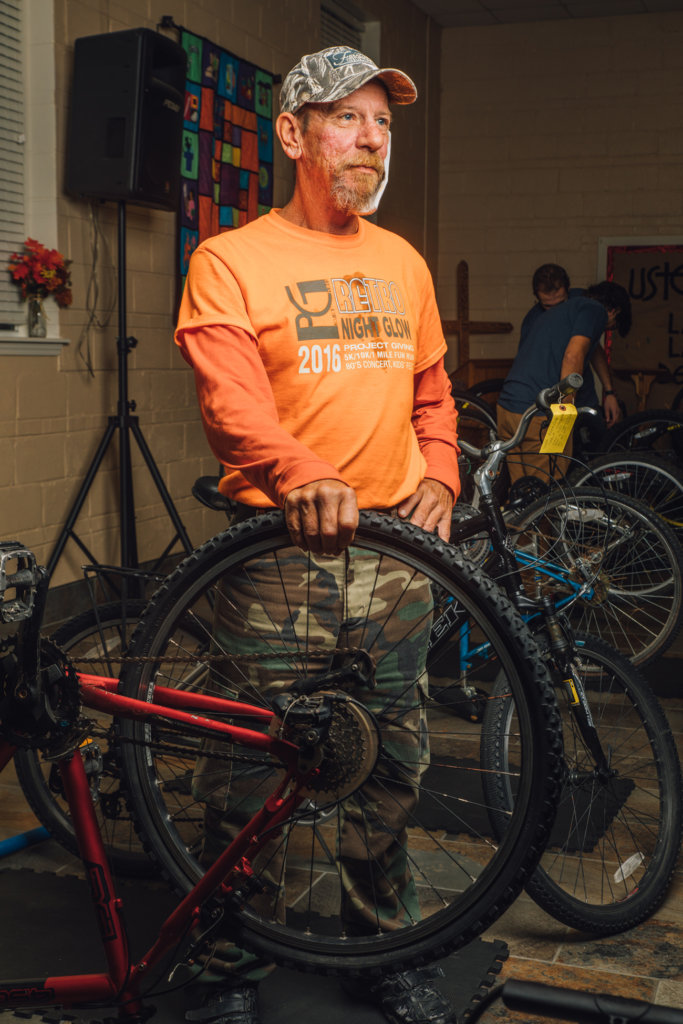
Jack Wood has a job now because he has a bike. Wood has a bike because someone donated one to Re-Cycle and their bike mechanic made sure it was roadworthy. Re-Cycle gave it to Wood, who is 60, after he worked a required five hours of community service to earn it. Wood said his five hours were spent cleaning a community garden operated by Centenary Community Ministries Inc., which runs Re-Cycle Macon and other community service ministries.
A former Navy man, Wood said he’s been around the world three times – his favorite spot is an island in the Indian Ocean – but in recent years came to a place in life where he couldn’t even get around Macon. A mix of circumstances and ill-fated choices left him homeless with even public transportation economically out of reach. He said not many years ago, the only hard thing about getting from his then-home in Lizella to Macon was picking which of his three cars to drive. Now, he said he lives on “a piece of ground around Macon somewhere” and he chooses not to divulge exactly where.
“But,” Wood said optimistically, “now I have a job – a part-time job, anyway. It’s across town from where I stay and I could never get there walking. With the bike, though, it’s pretty fast and I’m not beat when I get there. The bike’s changed everything, from getting to work, to stores, to getting to medical care. I’d be so worn out walking all the time that sometimes I just wouldn’t. The bike’s a godsend. It’s a blessing and the people who fixed it are a blessing. I got a bike and got a life back. Really.”
Wood is a Re-Cycle evangelist. He tells others in the same shape he’s in they should go to Re-Cycle, “talk to Eric,” do five hours service and earn their bike. He tells them they’re foolish if they don’t and that Re-Cycle even helps keep bikes running when something goes wrong.
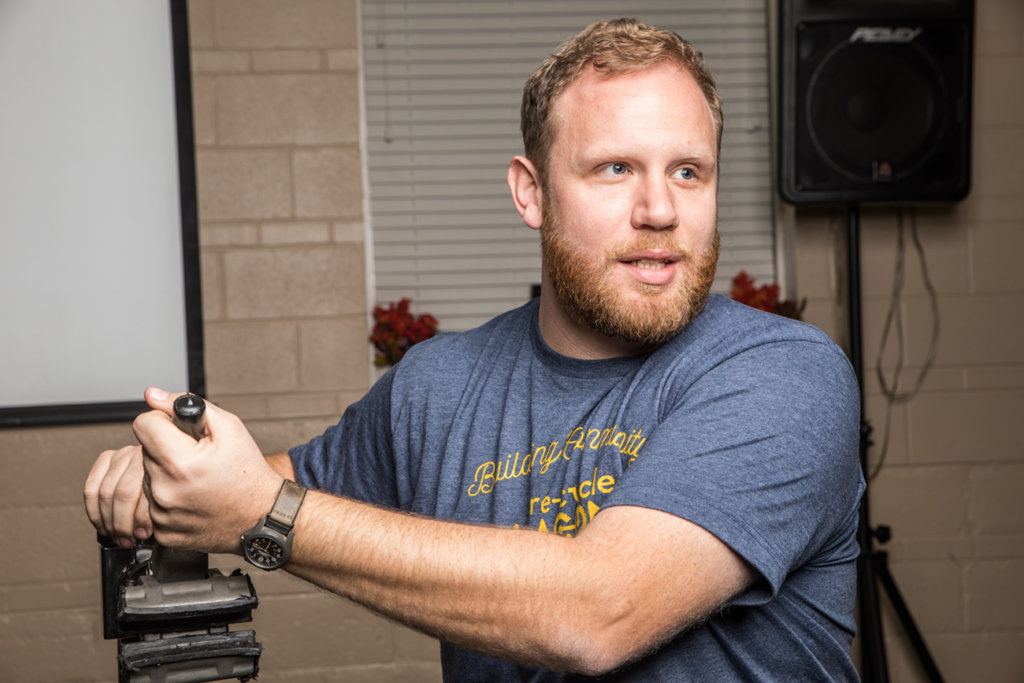
“Eric” is Eric Myle, executive director of Centenary Community Ministries (CCMI) and a staff-minister at Centenary United Methodist Church. Centenary initiated CCMI in 2009. Now, CCMI is a separate organization involving other churches, community and business partners and volunteers. Centenary still provides operating space for most CCMI endeavors, including Re-Cycle, at its near-downtown location on the corner of College and Ash streets.
“Re-Cycle started in 2017 when we began fixing donated bikes and making them available,” Myle said. “It started and continues largely through grants from the Knight Foundation and the Georgia Council on Developmental Disabilities plus the volunteerism of others. In February 2019, we added the co-op, which is a gathering every third Thursday of the month in Centenary’s fellowship hall on Ash Street. People come and we work on bikes at no cost. We supply parts and share a meal.
“We just spend time together around the bikes and food. People come who’ve gotten our bikes and people come who need a bike fixed. Some can do part of the work and some can’t do anything. Some want to learn. Other people come volunteering to help with repairs, some just come for the meal and others want to be in on what’s going on here: We’re fixing bikes and providing transportation, right, but we’re building a very diverse community that transcends racial, social, economic and other barriers. At its heart, that’s what Re-Cycle is.”
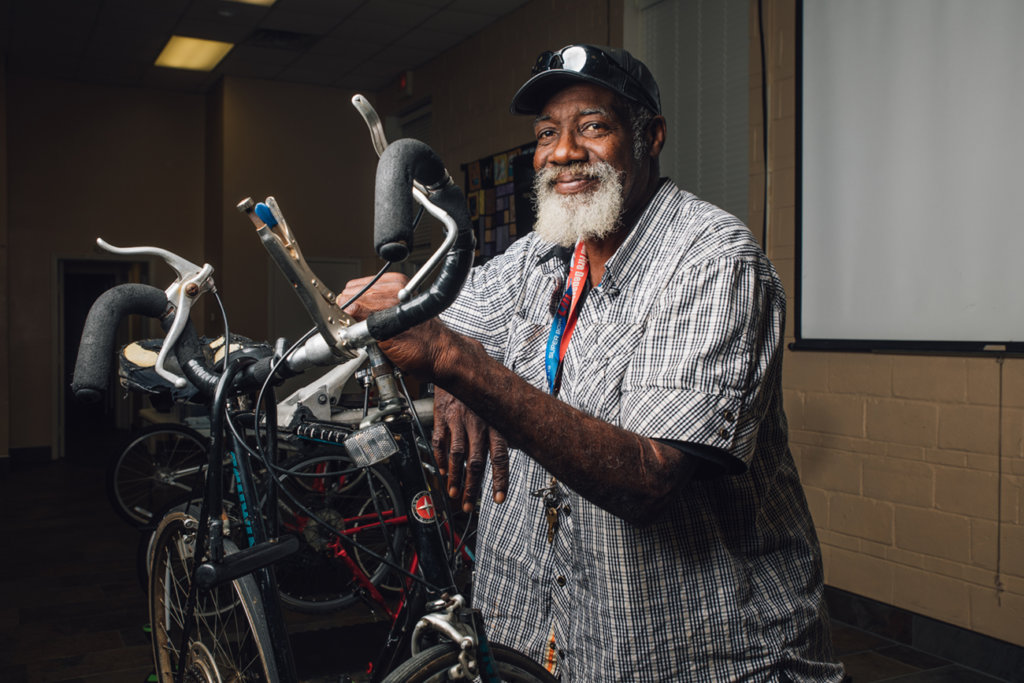
Ocie Lewis, 58, is at almost every monthly co-op. After earning his bike, he became such a regular and learned so much repair that it’s difficult to peg him as a recipient or a volunteer – he’s both.
“I worked like a slave most all my life until I was disabled,” he said. “I cut tobacco, picked cotton, picked pecans, pulled weeds, drove a tractor and did cotton gin work until I couldn’t do it no more. Walking any distance made me almost cry and I couldn’t get anywhere. That’s without the bike. I was one of the first to get one – I can’t get no car – but the bike lets me get to the doctor and hospital downtown.
“It doesn’t hurt so much and it’s a healthy thing – that is, if people in cars don’t run you down. You have to watch. You have to do your part to keep things safe because a lot of times those people in cars don’t pay attention. You learn how to be safe at the co-op and they give you a lock and helmet. They surely stress safety.”
Ocie said a truck once hit him, turning into his path without warning. It knocked him out, but he was at least glad he didn’t land on his hip, which was “already torn up anyway.”
“But I can ride again now ‘bout anywhere in God’s world,” he said. “We fixed my bike. It makes me all glad I can change tires and do a little work to help others. It may be only a little, but doing it, you know you’re making the world a little better for someone. There’s nothing like doing that.”
“When Bike Walk Macon started in 2015, we saw Macon needed an earn-a-bike program. It was exciting when Eric Myle first said Centenary Community Ministries wanted to start one and we’ve stayed on board since, partnering with bike rides, bike parties, our Open Streets events and otherwise. I love what they’re doing. I love when someone comes to us wanting to donate a bike somewhere, and there’s Re-Cycle to send them to.” — Rachel Umana of Bike Walk Macon
Rachelle Wilson is Re-Cycle Macon’s program director. Her day job is development director at Rebuilding Macon. Wilson became a bike commuter out of necessity in her college days in Atlanta and is a vault of information about Re-Cycle.
She will quickly tell you important dates like the co-op’s one-year birthday bash set for Feb. 20 at Centenary’s fellowship hall. She says the public is encouraged to attend.
“Our process is simple for people with transportation access issues and it goes on all the time,” she said. “Basically, it’s to drop by Centenary and tell Eric you want a bike. He’ll typically tell you, ‘Show up Tuesday at 10 a.m., bring your lunch, be prepared to work your five hours and by 3 p.m. you can leave with a bike, a lock and a helmet. If it needs repair later, bring it to a co-op and someone will likely be able to fix it. And if it’s not broken, come anyway, have a meal, meet people, be part of the community.’ ”
Wilson said the biggest need is not for more bike donations, though they’re welcomed, but for people all across Macon to be involved, share their lives and stories with others and help build a community.
“We see bikes change lives,” she said. “We see how being part of such a community can be life-changing for all involved.”
Wilson emphasizes bikes are earned – so there’s equity involved. She said though records aren’t perfect from their earliest days, people have earned more than 75 bikes. She especially credits Bike Tech bicycle shop at 3003 Vineville Ave. for its involvement. That is where Re-Cycle’s main mechanic Lu Hawthorne is employed and the shop is owned by Bobby Schorr, who Wilson said is fully behind Re-Cycle’s program and also Macon’s youth-oriented training and mentoring program, the Learn & Earn Bike Shop.
“Our slogan is ‘Building Community through Building Bikes,’ ” she said. “Community is our first goal with people helping people in an inclusive environment and with a meal being the great equalizer.”
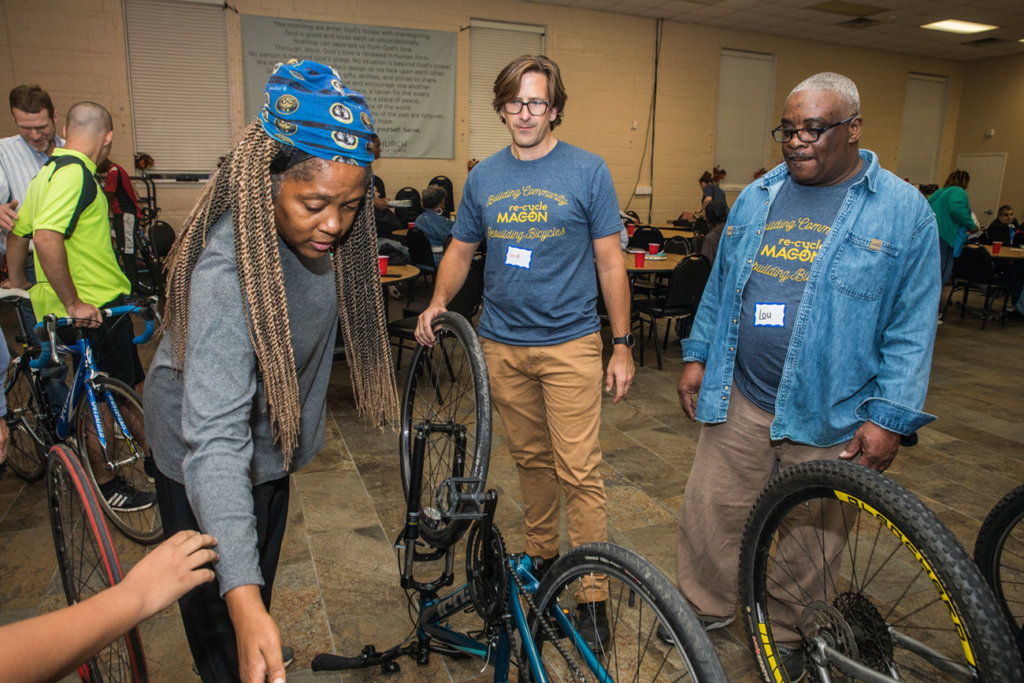
Wesley Glen Ministries is a big part of Re-Cycle Macon and reflects efforts to build a widely diverse community. Wesley Glen provides adults with developmental disabilities both day programs and live-in environments to help them with skills and confidence to live happy, full lives as contributing community members.
Many from Wesley Glen take part in Re-Cycle’s co-op and activities, though few receive bikes. The two organizations share the desire to break barriers and build community.
“One of our biggest goals is to have those we serve included and involved in community in many ways and places,” said Wesley Glen’s Julie Rogers. “Re-Cycle gives the opportunity to build relationships with another population in the city. They also learn a thing or two about bikes if they want to. One of our guys is working now to start a bike club. They love taking part and it’s very empowering for them.”
Teresa Kane is 50 and has been on the streets since 2016. She came by bus to Macon from Gainesville over a year ago seeking work. That hasn’t happened. Someone did give her a bike, though, and now she depends on Re-Cycle to keep it going.
She’s a co-op regular.
“Macon is tough on bikes,” she said. “The way the roads are with all the construction and debris a lot can happen to tires and all. But you can get help here. They can teach you, get you parts and do more if something happens. Besides my own getting around, I volunteer at the Daybreak Center and my bike makes it so I can get there. If you prioritize your day, a bike lets you get around pretty well. Some days may be cold, but the trip is quicker on a bike. You can handle that.”
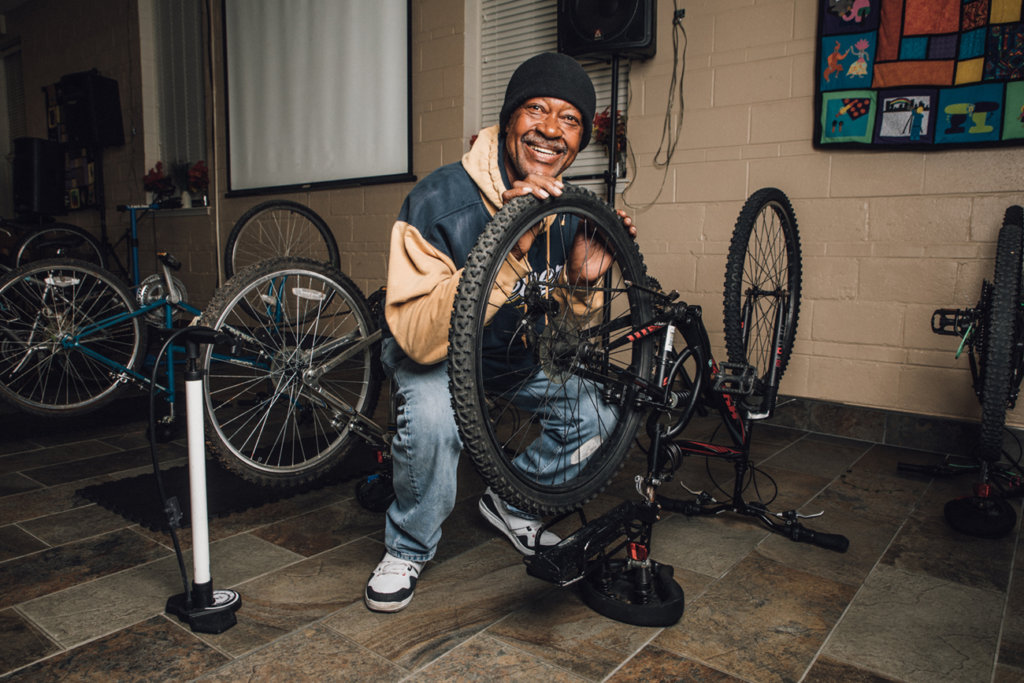
Macon native Clifford Sanders, 67, said he’s ridden a bike since he was a kid – when he’d put playing cards on the spokes and sound like a motorcycle. Riding is good exercise for his aging legs, he said, and it builds stamina that adds healthy years to his life. He rides to work and all over Macon. He comes to the co-op occasionally for bike fixes and agrees that Macon streets can be tough on tires.
“I never got a bike for Christmas but somehow somebody always gave me an old one or I traded for one,” he said. “Once I found out they fix bikes here I came right on. I ride so much I’m always needing inner tubes or patches. They’ve got real bicycle men here who know how to do stuff I can’t do and provide things I can’t afford.”
“I’m happy where things have come for Re-Cycle and for the co-op’s first year,” Myle said. “If we lost funding tomorrow and the work flopped, I think it’s amazing what’s already been accomplished. But it’s absolutely incredible seeing people come together and volunteers and people who’ve gotten bikes becoming leaders and taking ownership. They have opinions and ideas and care deeply – that’s a benchmark. People wonder how they can help Re-Cycle and folks like Jack and Teresa. Well, come see. See the bikes and see the bigger picture. Come ask Ocie, he can tell you what’s going on.”






